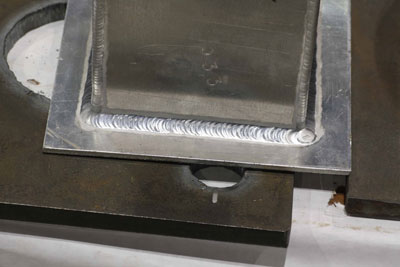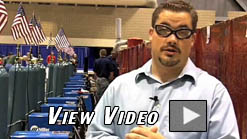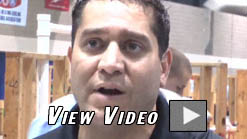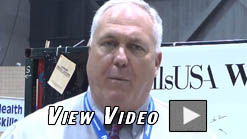SkillsUSA, a national nonprofit organization that works to ensure a skilled workforce, provides high school and postsecondary welding students some serious food for thought-such as how welding will fit into their future. More often than not, however, welding will not only fit into a student's future; it will shape it, and the SkillsUSA competition is one-very large-step.
The 2010 SkillsUSA National Leadership and Skills Conference, held in Kansas City (June 22-25), is proof positive that working hard to achieve skills can help shape a student's future.

Post-secondary welding contest winner Alex Pazkowski of Washtenaw Community
College practiced for 16 hours a day; this is his actual TIG aluminum contest weldment.
The Best of the Best: Competing for Excellence
Students competing at both the high school and postsecondary levels see welding in their future. Skeeter Judd, a student at Douglas High School in Douglas, Wyoming, competed in the Welding Fabrication contest. Thirty-five teams drew their own plans for a barbecue grill that was then welded and fabricated in Kansas City within a strict time limit. Judd was competing for excellence, period.
"SkillsUSA gives me a chance to see where I stack up with the other people so that I can see how good I actually am," says Judd, who won a silver medal as part of the Welding Fabrication team from Douglas High School. "Everyone thinks they're the best, but here it's the best of the best."
Beyond high school, Judd wants to continue to hone his welding skills. "After high school, I want to go to college and continue welding," says Judd. "I don't know where yet, but I do want to go to college and get certified in everything I can."
For a high school student who began welding in seventh grade, Judd has a relatively clear picture of how welding will shape his future career. "I want to be a structural welder or even a welding instructor," says Judd.
For five high school students from Mingus Union High School in Cottonwood, Ariz., welding is only part of what they are learning. "You can go into welding, but that's only part of it," says Kyle Alexander. "Then there's the other half of it, the leadership skills that will help bring everything together."
While all five students have different education and career plans, all of their plans include welding, with one student planning to double major in music and welding in college. He doesn't believe he needs to compromise when it comes to his creative passions. "I've been playing piano since the first grade," says student Cameron Selna. "I play the saxophone and I'm learning guitar. I love to weld, but music is a huge part of my life, too."
The only woman in the Welding contest, Kourtney Wills, from Greeneville-Green County Center for Technology in Greeneville, Tenn., recently graduated and has no doubt that she will move into a welding career. "I want to make a career out of it," says Wills. "I'm thinking about the aerospace industry."

Veronica Schaefer, a student from Paso Robles High School in Calif., missed the regional welding competition but participated in the Prepared Speech contest. Schaffer is taking Advanced Welding in her junior year and plans to become a welding teacher or weld in construction. SkillsUSA has influenced her career path.
"I believe SkillsUSA prepares kids for the workforce," says Schaefer. "It gives kids the opportunity to see if they want to use their skills to further their career goals. I want to go to a junior college, complete my general education, get certified and then hopefully go to a Christian college. I want to help build things someday."
While many students believe welding will shape their future, others have no idea how much. Nick Peterson, a welding engineer for Miller Electric Mfg. Co., is one of those students. From SkillsUSA, Peterson advanced from state to national to WorldSkills International in Taiwan in 1993. His bronze medal and $40,000 scholarship funded by Miller dramatically changed his future.

"The scholarship allowed me to continue my education and get a bachelor's degree in welding engineering technology," says Peterson. "By getting involved in SkillsUSA, my career went in a different direction and allowed me to realize my full potential as a welding engineer. College may not be for everyone, but we need welders, welding technicians, welding inspectors and welding engineers. We need welding; it's critical to our infrastructure."
Good Instructors, Supportive Parents Make All the Difference
Certainly, students must have the drive to succeed in order to compete at the national level and go on to build a successful welding career. This type of student, however, doesn't emerge without a good instructor and supportive parents. In fact, Instructors must be willing to put in a lot of time and effort with each potential SkillsUSA contestant. For many, it means training individual students for the duration of their program.
One husband and wife educational team, Dennis and Laurie Carrier, are actually transitioning one student from Dennis' school program into Laurie's college program.
"It takes a lot of hard work and training," says Dennis Carrier, a welding instructor at Berlin High School in Berlin, New Hampshire. "I am in a two-year program, so this student has been with me for two years. He has trained hard for two years to get here, but it's opened a lot of doors and avenues for future employment and schooling."
"He's already received many scholarships," confirms Laurie Carrier, program assistant for the Division of Community Education at White Mountains Community College in Berlin.
To get to this level requires more than time welding; it requires focus and confidence. "I want students to believe in themselves and know that they can do something in the welding industry," says Dennis. "I work hard on this part of it, too. I want them to be focused and ready for industry."
Keith Simpson, an instructor from Des Moines Area Community College (DMACC) in Iowa, brought both a high school and a college student to the competition. "I teach high school in the morning and college in the afternoon at the (DMACC) Career Academy," says Simpson. "SkillsUSA makes a big difference. If SkillsUSA is on a resume, any company that knows anything will put it at the top of the pile."
Parents prove that they have an equally strong influence on the success their son or daughter achieves at SkillsUSA and beyond. Jim Dzieszaowski, from Lapeer County, Michigan, is 100 percent supportive of his son Joe's w
elding career plans. "I am self-taught at what I do," says Jim. "I wasn't college educated and didn't go to a trade school, but I believe that a good work ethic and proper training go a long way. SkillsUSA provides a great head start for these students." Son Joe Dzieszaowski, adds, "I definitely think that welding will be part of my future. I am thinking about aviation."
Industry Partnerships and Support
The success of SkillsUS
A depends on the continued support of our youth and welding education. At all levels of SkillsUSA competition-State, National and World-Miller offers assistance so that young welders gain the skills required to succeed.
At the state/regional level, Miller awards prizes to all gold medal winners of high school and post-secondary welding competitions held annually. At the national level, Miller donates equipment needed for the annual SkillsUSA Championships. This year alone, Miller donated 15 Millermatic® 252 all-in-one MIG welders for the Welding competition, as well as six FILTAIRTM MWX-D Mobile Fume Extractors and 13 Syncrowave® 250 DX TIG welders for the Welding Fabrication contest. At WorldSkills, held every two years, Miller sponsors a $40,000 four-year scholarship to be awarded to the U.S. Open Weld Trials Champion who represents the United States and competes in the WorldSkills competition (London, 2011).
Peterson and Miller devote their time and equipment to support SkillsUSA and stay connected to welding education efforts, as well as to sustain the industry with skilled employees.
"We do what we need to do to make this event happen, because it's an outstanding organization that creates leaders in the welding world," says Peterson. "At Miller, we continue to employ the best available candidates through programs such as SkillsUSA. The $40,000 scholarship provides amazing opportunities for a lucky few. People hear about football scholarships, not welding scholarships. We can provide a welding scholarship, and we are very proud of that. We know we're developing the right people."
Miller continues to fund AWS welding engineering scholarships in addition to the World Skills Competition Scholarship. So committed is Miller to the AWS Foundation's effort to educate and train entry-level welders that it participated in a joint $1 million pledge to provide initial funding for the American Welding Society Welder Workforce Development Program. The program was developed as a direct effort to address the shortage of trained welders in the United States.
The industry is indeed hungry for skilled welders. Industry and school representatives often form advisory committees that meet on a regular basis to discuss their needs. Industry can offer schools training tools and resources, as well as job placement; while schools can teach required industry skills and fulfill hiring requests, benefiting students, schools, industry and the community. Involvement in SkillsUSA enhances all of these positive relationships to create more opportunities for those who desire a future in welding.
Dan Rivera, a welding and metal fabrication instructor at Blackstone Valley Regional Vocational Technical High School in Upton, Ma., believes in staying connected to local industry. His program allows those students who have performed well academically and in the shop to move out into the field to get some hands-on welding experience.

Jim Thompson, welding department head at Wallac
e State Community College in Hanceville, Alabama, knows the importance of his school's local industry relationships. Through the local AWS chapter, the school holds welding contests and asks for involvement from area industry. This opens the eyes of potential employers; they learn firsthand the vast welding skills that students possess.

John Bruskotter, president of the American Welding Society for 2010, echoes the need for matching industry with skilled welders. He predicts that the future of welding will continue to grow and therefore necessitates major support for our youth in welding and skilled trades.

A Dream Takes Shape
Post-secondary Welding contest Gold Medalist Alex Pazkowski of Washtenaw Community College, provides some insight into his competitive spirit and future plans. "I wanted this gold medal more than anything," says Pazkowski. "I wasn't going to let anyone take it away from me."
And Pazkowski has a dream. "I think about winning that $40,000 scholarship everyday. I see becoming a welding instructor someday; that is my dream job." Once again, for these competitors, welding doesn't just fit into their futures, it shapes them.